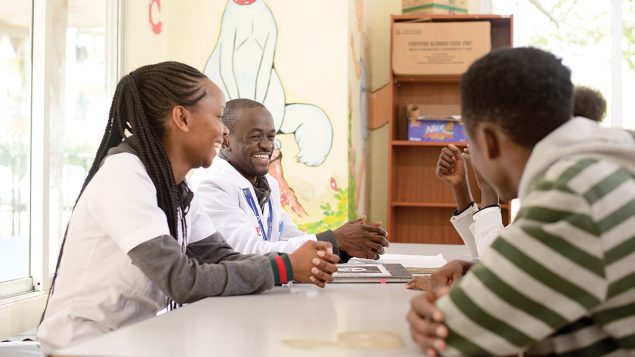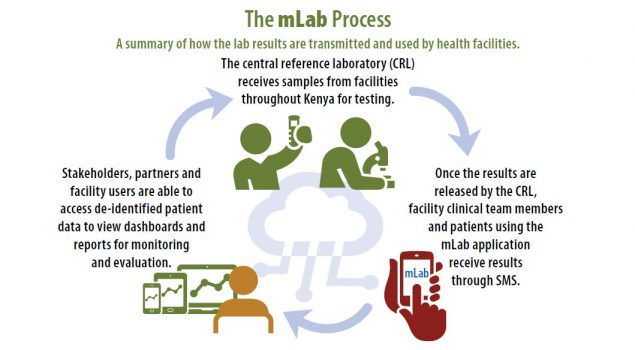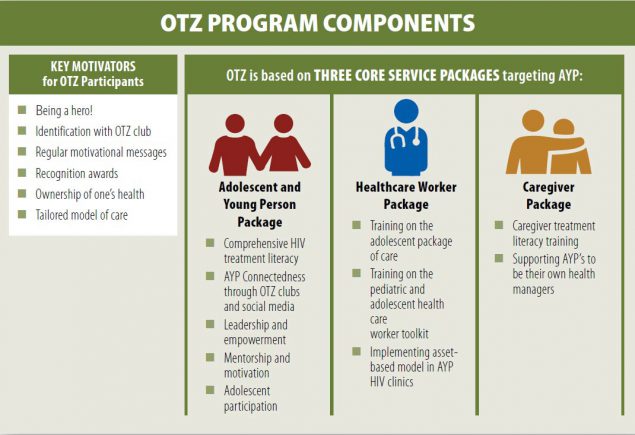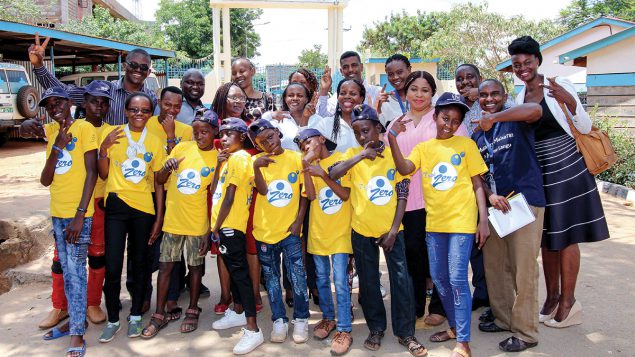CDC Kenya Service


Service stands as a core tenet of CDC’s priority activities through the delivery and implementation of interventions for the most vulnerable populations. Through service delivery, CDC seeks to accelerate progress toward a world safe from disease threats and where lives are saved and health is improved.
As Kenya continues to make gains in controlling the HIV epidemic, targeted strategies are paramount in helping to stop the spread of disease. In 2018, the U.S. President’s Emergency Plan for AIDS Relief (PEPFAR) launched the MenStar Coalition to accelerate the delivery of innovative approaches in HIV services for men. Recent HIV-related data show that “men are less likely to know their status, practice consistent prevention, or access treatment.” CDC, together with its implementing partners, is leading the way to identify effective strategies that reach men so that they know their status, stay on treatment and manage their health—one such strategy is taking off in the remote areas of Turkana County.
Epedor
“Epedor” loosely translated from Turkana to mean “it is possible” is a program that is transforming the lives of men in the Turkana community. Similar to what has been observed globally, the Lokitaung health facility, a CDC-supported site, has recorded sub-optimal viral suppression and retention among their male patients. Given the challenges seen in the health facility, program administrators with the Elizabeth Glaser Pediatric AIDS Foundation (EGPAF) devised a differentiated service delivery model for men—Epedor is a tailored approach to providing HIV-related care for this group’s unique needs.
Turkana is largely known to be a patriarchal society, where males have a strong influence over their families. Epedor serves as a men’s adherence club and a social support group that offers peer-to-peer learning. Through peer education sessions about HIV treatment, Epedor calls on participants to make commitments to address various aspects of their life, including:
- Actions to improve their health,
- HIV testing for their spouse and children,
- Income-generating activities,
- Advocating against gender-based violence, and
- Avoiding alcohol and substance abuse.
The men’s adherence club has led to considerable improvements among the males enrolled to date, including a reduced number of missed appointments, increased adherence to HIV treatment, and higher viral suppression rates. With these encouraging results, Epedor was quickly replicated in four other health facilities across Turkana. Epedor demonstrates that with a committed group of men, it is possible to witness transformative results.


Members of Epedor meet and discuss life issues. The group has also helped to bolster household food security in the often drought-affected region of Turkana. Photos by Gibson/EGPAF
3 PEPFAR Press Release, 2018. Global Partners Pledge over $1.2 Billion to Launch the MenStar Coalition

Asked why she takes time away from her own family to tell her story over and over, Lucy explains, “Disability from a vaccine preventable disease is a huge burden on both the child and the parents, especially in my community. When a child is fully immunized, the child is secure, and the parents are too.”
A survivor of polio, Lucy Nkatha makes an impassioned case for immunizations when she meets with parents, women’s groups and others skeptical about vaccines. Lucy is an “immunization champion” and in Meru County she is at the center of a national Polio Immunization Campaign team. The team—which includes WHO, CDC, UNICEF, and community partners—works tirelessly to prevent further spread of a strain of polio circulating in nearby Somalia and detected in an environmental sample in Nairobi.
Lucy received just one dose of the poliovirus vaccine as an infant in the late 1970s. As a result, she was not fully protected from the disease when at 3-years old, she became ill. Lucy was the third of nine children, and it was not easy for Lucy’s parents to access a medical facility to vaccinate their children from their rural village of Limauru in Ncooro, Meru County.
While Lucy doesn’t remember life before polio, her mother Joyce does. Joyce remembers Lucy as a healthy, active toddler. She recalls Lucy following behind her older siblings when they went to the stream to get water and filling her own, smaller pail. When Lucy fell sick with polio, everything changed. She spent three months in the hospital, and for the first two months after returning home, Lucy couldn’t walk, move, or sit up on her own. One day, she began crawling, and that was how Lucy got around until she was 7-years old.
Lucy’s disability made it impossible for her to walk the rocky hills to the primary school nearby, so she couldn’t attend school with her brothers and sisters. When a schoolteacher heard about Lucy’s situation, he took her to a missionary school for the disabled in nearby Tuuru. There, she received a cane and a caliper to help her walk and discovered a love for learning.
Twenty-five years later, Lucy is now 40-years old, married, and a mother to three teenage children. After running a hair salon for ten years, Lucy now focuses full-time on her family, volunteering in her community, and serving as a disabilities advocate and immunization champion. Says Lucy, “While I’ve managed to get beyond it, it’s very tough to grow up with a disability in rural Africa” and Lucy doesn’t want any other child to endure the struggles she did. This is her second time serving as an immunization champion for a polio vaccine campaign—she also supported the 2016 campaign.
During that campaign, Lucy visited the pastor of an indigenous faith who had warned followers against the polio vaccine. Sharing her story and the struggles she endured, she convinced the pastor to support the polio vaccination campaign. In the 2018 campaign, Lucy once again talked to religious leaders, parents, and women’s groups about the importance of vaccinating every eligible child, every time the vaccinators come around. And again, Lucy is changing minds.

Mobile solutions are reshaping various sectors in Kenya, and are taking root in the new age of communication. With the rapid advancement in mobile technology, the health care industry has not been left behind. Mobile technology is helping to enhance the delivery of health services and communication between public health systems, medical services providers, and patients.
In Kenya, where the doctor to patient ratio is 1:10,000, the need for innovation in the health sector is critical if hospitals and clinics are to offer quality services. Additionally, communication challenges among health care providers, patients and caregivers tends to be extremely frustrating. mHealth Kenya has been a local implementing partner for the CDC Foundation in the country, overseeing and managing mobile technology projects in the health sector. Its innovations seek to bridge the communication gap between doctors and patients and to put health services within the public’s reach.
In 2018, CDC—through PEPFAR funding and other laboratory stakeholders – collaborated with mHealth Kenya, an implementing partner, to develop an easy to use mobile application branded “mLab.” mLab offers access to real time viral load (VL) and early infant diagnosis (EID) results that are both secure and confidential. This enables facilities that lack proper infrastructure or internet to receive results through a secure short message system (SMS)-based platform.
Through this innovation, health facilities in Kenya have experienced reduced turnaround time in receiving their patients’ VL and EID results from the central reference laboratory. Consequently, patient management has been improved because of the faster access to results, flagging of actionable results and ensuring that decisions for patient management are based on actual patient results. To date, mLab has been rolled out in over 65% of all Kenyan counties, is being used at 731 facilities, and has transmitted over 725,000 results to patients.
The mLab initiative has brought together a team of experts with a diversity of knowledge, experience, and a deep understanding of the health sector. The user-friendly format of the mLab app and the fact that it does not indicate personal identifying information offers a viable and sustainable solution for health communication across the country.

Kenya has been recognized globally for its new and innovative approach for reaching young people living with HIV who account for approximately 20% (303,700) of all people living with HIV in the country. Operation Triple Zero (OTZ) is designed to motivate adolescents and young people to take responsibility for their own health. The program nurtures the potential and strengths of adolescents in this regard. These adolescents are engaged as ‘co-producers’ in their health and motivate their peers through positive pressure and forge a shared commitment to achieve the three zeroes—zero missed clinical appointments, zero missed drugs and zero viral load.
Globally, young people (10 to 24 years), especially young women, continue to be disproportionately affected by HIV. This is the only age group in which AIDS-related deaths are not decreasing globally. In 2019, 2.1 million people aged between 10 and 19 years were living with HIV and 260,000 became newly infected with the virus.4
There are many factors that put young people at risk of HIV. Adolescence and early adulthood are a critical period of development when significant physical and emotional changes occur. The transition from childhood to adulthood is also a time for exploring and navigating peer relationships, gender norms, sexuality and economic and personal responsibility. These factors often lead to suboptimal HIV treatment outcomes among this age group due to a decrease in follow up, low adherence to treatment and low viral suppression.
“When I joined secondary school, I experienced a lot of stigma. I stopped taking my medications and this led to deterioration in my health…I joined an OTZ club…have taken charge of my health.”
—18 year old adolescent living with HIV

In November 2018, CDC Kenya organized a week long site visit with staff from CDC and USAID offices located in Nigeria, Ethiopia, Malawi, and Mozambique.
OTZ scale-up in Kenya has realized exponential growth from just one facility with 70 adolescents enrolled in 2016, to reaching approximately 47,000, or just over 60%, of all adolescents living with HIV. Data from 19 early-adopter partners show an average viral suppression of 85% in Kenyan youth enrolled in OTZ.
Kenya has received global recognition for this ground-breaking initiative, which is now recommended in the 2019 operational guidelines for all PEPFAR countries. In 2018, Kenya hosted technical teams from CDC Atlanta as well as staff from the U.S. Agency for International Development (USAID) and the Department of Defense from four countries – Nigeria, Ethiopia, Malawi and Mozambique to help them learn how to extend the OTZ initiative into their countries’ HIV/AIDS programming.
Adolescents’ ownership of OTZ saves time and resources that would otherwise be used for counseling, making it easier and cheaper to scale up. Under its motto “Heroes for Zeros and Zeros for Heroes, It takes a Hero to be a Zero and a Zero to be a Hero” young people are demonstrating their ability to take the lead over their own health and inspire others to do the same.
The year 2018 was particularly important for PEPFAR, as it marked the fifteenth anniversary of its enactment. When PEPFAR began, only 7,800 Kenyans living with HIV were on lifesaving antiretroviral treatment. Today, more than 1 million men, women and children are on treatment and able to live positively. To help celebrate these gains, the U.S. Department of State hosted a number of initiatives including a World AIDS Day 2018 event at one of the first PEPFAR sites, a gender-based violence photo exhibition, and a documentary highlighting the HIV journey in Kenya.
World AIDS Day: A Day of Celebration and Service

U.S. Embassy leadership, including Ambassador Robert Godec, celebrated the importance of youth taking ownership of their health and getting tested for HIV.
The World AIDS Day 2018 event doubled as an opportunity to serve and engage with the community in the informal settlement of Kibera, one of the largest such settlements in sub-Saharan Africa. Volunteers from the U.S. Embassy painted exterior walls, decorated the pediatric ward, and planted flowers and trees – allowing for a visual transformation of the health facility’s main entrance. The volunteers stepped out into the community and saw first-hand the important role of health diplomacy and how it contributes to improving health and safety globally. In his remarks, U.S. Ambassador Robert Godec shared that “Today, death and despair have been overwhelmingly replaced with hope and life.” This was the theme of the WAD 2018 pre-event, honoring those lives lost while celebrating the lives regained over the last 15 years. The formal ceremony also served as the premier of the PEPFAR Kenya documentary, which demonstrated the progress made towards controlling HIV and AIDS through collaborative efforts.
Honoring “Champions for Change’
Additionally, the U.S. government launched the gender-based violence (GBV) “Champions for Change” photo exhibition to honor individuals in the community that serve a critical role in preventing and responding to acts of GBV. These Champions included a Maasai moran (young male leader), a police officer, a former street girl, boda boda (motorcycle taxi) operators and more.
Kenya’s Cabinet Secretary (CS) for Education, Ambassador Amina Mohamed, Nairobi Women’s Representative, Esther Passaris, and Ambassador Godec were among the chief guests. In her remarks, CS Mohamed highlighted the harrowing statistics of school-going children being abused on their way to and from school and her decision to change official school hours nationally. Ambassador Godec remarked, “The U.S. government recognizes that ending gender-based violence is paramount to securing a strong and health future for all.” The photo exhibition ran during the 16 Days of Activism Against GBV which is an international campaign aiming to generate awareness and call attention to GBV.
During this period, CDC Kenya and its implementing partners reported the following accomplishments from fiscal year 2018:
More than 7.7 million Kenyans know theirHIV status.
92% of patients living with HIV and on treatment have achieved control of the HIV virus (or viral suppression).
More than 400,000 pregnant women know their status. And of those tested HIV positive, 99% are on HIV treatment, making it possible for babies to be born HIV free.
Over 190,000 men received a voluntary medical male circumcision—97% of CDC Kenya’s annual target—to help prevent them from acquiring HIV infection.
While the PEPFAR 15 campaign was an important reminder of the progress made, we have a small window to finish the job. If the global community does not control HIV now and use every tool available, there is risk of these gains being undone.

Margaret Waithera, shares her experiences as a survivor of abuse who now owns her own business and mentors young girls.

Douglas, a Maasai Moran (young male leader), is recognized for going door to door sensitizing his community on the dangers of female genital mutilation.